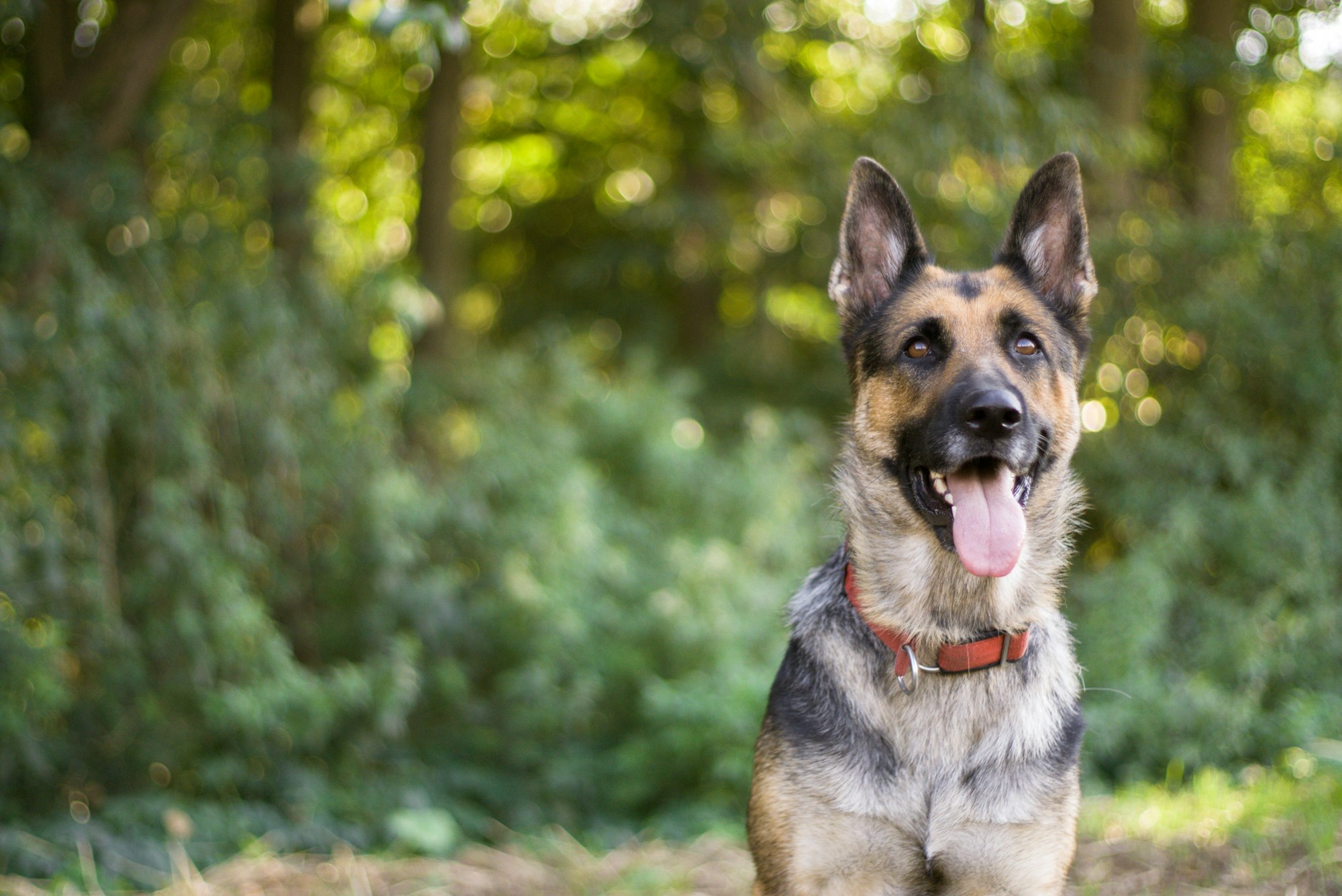The German Shepherd is a beloved dog breed known for its intelligence, loyalty, and versatility. If you are a fan of these magnificent canines, here are 12 interesting facts about German Shepherds that you should know:
Fact 1: Origin and History of German Shepherds: German Shepherds were developed in Germany in the late 19th century for herding and guarding sheep. They were later recognized for their exceptional working abilities and became popular worldwide.
Fact 2: Appearance and Characteristics of German Shepherds: German Shepherds are medium to large-sized dogs with a strong and muscular build. They have a distinctively noble and confident expression, with erect ears and a bushy tail. Their coats can vary in color and are usually dense and double-layered.
Fact 3: German Shepherds as Working Dogs: German Shepherds have a long history of being utilized as working dogs due to their intelligence, trainability, and versatility. They excel in various roles, including police and military work, search and rescue operations, and as service dogs for individuals with disabilities.
Fact 4: German Shepherds and Intelligence: German Shepherds are highly intelligent and rank among the most intelligent dog breeds. They have a remarkable ability to learn and understand complex commands, making them exceptional working and obedience dogs.

Fact 5: German Shepherds as Family Pets: While German Shepherds are often associated with their working abilities, they are also wonderful family pets. They are loyal, affectionate, and protective, making them great companions and guardians for their human families.
Fact 6: German Shepherds and Training: German Shepherds thrive on training and mental stimulation. They require consistent and firm training methods to bring out their best qualities. Obedience training is essential for their well-being and to ensure they are well-behaved members of society.
Fact 7: German Shepherds and Health Concerns: Like all dog breeds, German Shepherds are prone to certain health issues, including hip and elbow dysplasia, degenerative myelopathy, and bloat. Regular vet check-ups and a healthy lifestyle can help mitigate these risks.
Fact 8: German Shepherds and Exercise Needs: German Shepherds are energetic dogs that require plenty of physical exercise and mental stimulation. They should be provided with daily walks, playtime, and activities that challenge their minds to prevent boredom and behavioral issues.
Fact 9: German Shepherds as Emotional Support Dogs: German Shepherds possess a calm and reassuring demeanor, which makes them ideal candidates for emotional support work. Their innate ability to provide comfort and companionship can greatly benefit individuals struggling with emotional difficulties.
Fact 10: German Shepherds in Movies and TV Shows: German Shepherds have made numerous appearances in movies and TV shows throughout the years. From the iconic police dog in "Rin Tin Tin" to the loyal pet in "Hachi: A Dog's Tale," these dogs have captured hearts on the big screen.
Fact 11: Famous German Shepherds: German Shepherds have become famous for their roles in various fields. Notable German Shepherds include Rin Tin Tin, Strongheart, and Buddy, the first seeing-eye dog.
Fact 12: German Shepherds and Socialization: Proper socialization is crucial for German Shepherds to ensure they grow up to be well-adjusted and friendly dogs. Early and positive experiences with different people, animals, and environments can help them develop into confident and sociable companions.
By understanding these fascinating facts, you can appreciate and admire the German Shepherd breed even more for their remarkable traits and contributions to society.
Key takeaways:
- German Shepherds have a rich history: Originating in Germany, these dogs were originally bred as herding dogs and have since become popular for their intelligence and versatility.
- German Shepherds excel in working roles: Due to their intelligence, agility, and loyalty, German Shepherds are commonly used in police, military, and search and rescue operations.
- Proper training and socialization are crucial: German Shepherds require obedience training and specialized training to fulfill their potential and ensure they are well-behaved and safe in various environments.
Fact 1: Origin and History of German Shepherds
The German Shepherd breed originated in Germany in the late 19th century, making their origin and history quite intriguing. Initially developed for herding livestock, these intelligent and loyal dogs quickly gained recognition for their versatility. Captain Max von Stephanitz, the founder of the breed, played a pivotal role in establishing the German Shepherd breed standard.
Their exceptional working abilities paved the way for their popularity, leading to their usage by the police and military. However, their significance doesn't end there. Today, German Shepherds have expanded their roles beyond mere family pets. They serve as search and rescue dogs, therapy dogs, and service dogs, showcasing their incredible capabilities.
Fun fact: In the United States, German Shepherds hold the well-deserved position of being the second most popular dog breed.
Fact 2: Appearance and Characteristics of German Shepherds
German Shepherds are well-known for their distinct appearance and unique characteristics. Their appearance includes a well-built, muscular body with a double coat that offers protection in various weather conditions. They come in different colors such as black, tan, sable, and bi-color. In terms of size, male German Shepherds typically stand between 24-26 inches tall at the shoulder, while females are slightly shorter.
When it comes to their characteristics, German Shepherds are intelligent, loyal, and courageous dogs. They are highly versatile and excel in various roles, including working dogs, search and rescue, and service dogs. It's essential to regularly groom and exercise them to maintain their appearance and keep them both physically and mentally stimulated.
Fact 3: German Shepherds as Working Dogs
German Shepherds are fascinating creatures, especially when it comes to their role as working dogs. Fact 3 will dive deep into this aspect, shedding light on their involvement in police and military operations, as well as their remarkable contribution to search and rescue missions. Prepare to be amazed by their intelligence, loyalty, and the vital tasks they perform to protect and serve. German Shepherds truly exemplify the dedication and capabilities of these remarkable working dogs.
German Shepherds in Police and Military Roles
German Shepherds hold significant value when it comes to their involvement in police and military roles. This is primarily due to their exceptional intelligence, loyalty, and versatility. Their main responsibilities encompass apprehending suspects, detecting explosives or narcotics, and conducting search and rescue operations. Such demanding tasks are well-suited for German Shepherds due to their strong work ethic, agility, and keen sense of smell.
Their ability to adapt to various situations is honed through rigorous training. Additionally, their natural protective instincts and calm demeanor enable them to thrive in high-pressure environments. The invaluable contributions of German Shepherds in these roles undeniably highlight their worth as working dogs. It is crucial to emphasize the importance of proper training, socialization, and care for individuals aiming to acquire a German Shepherd for similar roles. This ensures the dogs' success and overall well-being.
German Shepherds in Search and Rescue Operations
German Shepherds in Search and Rescue Operations excel due to their intelligence, agility, and strong sense of smell. These dogs are often trained to locate missing persons in various environments, including natural disasters and wilderness settings. German Shepherds are capable of navigating difficult terrain and tracking scents over long distances with their keen sense of smell. They courageously work alongside human search and rescue teams, assisting in the location and rescue of individuals. The loyalty, trainability, and natural instincts of German Shepherds make them invaluable assets in these critical operations.
If you're considering a German Shepherd for search and rescue, it is important to ensure proper training and socialization from an early age. Regular physical exercise and mental stimulation are also essential to maintain their skills and overall well-being. German Shepherds in search and rescue operations play a vital role in saving lives and provide comfort to those in need.
Fact 4: German Shepherds and Intelligence
German Shepherds are renowned for their high level of intelligence, being ranked as the fourth most intelligent dog breed. German Shepherds and Intelligence They possess exceptional problem-solving skills, which makes them adept at various tasks such as search and rescue, police work, and service roles. German Shepherds have the ability to learn new commands quickly and have great memory retention. Their intelligence also allows them to understand and interpret human emotions, making them excellent companions.
In addition, their intelligence needs to be stimulated through consistent mental and physical exercise. A fascinating fact about German Shepherds and intelligence is that they can learn up to 250 words or commands, showcasing their remarkable cognitive abilities.
Fact 5: German Shepherds as Family Pets
When it comes to German Shepherds as family pets, there's no shortage of fascinating facts to explore. In this section, we'll dive into fact 5 and uncover the unique aspects of having German Shepherds as part of your family. From obedience training to specialized training, we'll unveil the secrets to raising a well-behaved and exceptional German Shepherd companion. So, let's delve into the world of German Shepherds as family pets, where loyalty, intelligence, and love merge into one incredible package.

Obedience Training for German Shepherds
Obedience Training for German Shepherds is essential to ensure they become well-behaved and obedient pets. Here are some steps to consider:
- Start early: Begin training your German Shepherd as soon as you bring them home.
- Basic commands: Teach them essential obedience commands like sit, stay, come, and heel.
- Positive reinforcement: Use rewards such as treats, praise, and playtime to reinforce good behavior.
- Consistency: Be consistent with your commands and expectations to avoid confusion.
- Socialization: Expose your German Shepherd to various people, animals, and environments to promote good behavior in different situations.
- Professional help: Consider enrolling your German Shepherd in obedience classes or seeking the assistance of a professional dog trainer for more advanced training.
Remember, patience and persistence are key when undertaking Obedience Training for German Shepherds. With proper training, your German Shepherd will develop into a well-mannered and obedient companion.
Specialized Training for German Shepherds
Specialized training for German Shepherds is crucial to harness their intelligence and agility. Here are some steps to follow:
- Start with basic obedience training to establish a foundation of discipline.
- Focus on advanced commands such as scent detection, tracking, and protection work.
- Introduce agility training to improve coordination and physical fitness.
- Consider enrolling in specific training programs like search and rescue or bomb detection.
- Utilize positive reinforcement techniques to motivate and reward desired behaviors.
- Ensure consistency and regular practice to reinforce training and maintain skills.
By providing specialized training for German Shepherds, you can unlock their full potential and equip them with valuable skills for various roles and tasks.
Fact 7: German Shepherds and Health Concerns
When it comes to German Shepherds and health concerns, it is important to be aware of certain conditions that are more commonly seen in this breed. Hip dysplasia and elbow dysplasia are two major orthopedic issues that German Shepherds can be prone to. These conditions can cause pain, lameness, and decreased mobility.
German Shepherds are also susceptible to certain genetic disorders such as degenerative myelopathy, a progressive spinal cord disease. Regular check-ups with a veterinarian, maintaining a healthy diet, and providing regular exercise can help mitigate these health concerns and ensure the overall well-being of German Shepherds.
German Shepherds were initially bred in the late 19th century by German cavalry officer Captain Max von Stephanitz. He aimed to create a versatile breed that excelled in herding and guarding. Over time, they became popular working dogs due to their intelligence, loyalty, and bravery. German Shepherds have since contributed significantly to various fields, including search and rescue, police and military service, and as therapy and assistance dogs. Their remarkable traits and fascinating history have made them one of the most beloved and recognizable breeds worldwide.

Fact 8: German Shepherds and Exercise Needs
German Shepherds are known for their high exercise needs, and it is crucial to provide them with regular physical activity for their mental and physical well-being.
- To fulfill their exercise requirements, it is recommended that German Shepherds engage in at least 1-2 hours of moderate to intense exercise per day.
- Running, walking, hiking, or playing fetch are excellent outdoor activities that can help meet their exercise needs.
- Incorporating mental exercises like obedience training, puzzle toys, or interactive games can provide the mental stimulation that German Shepherds require.
- For socialization and exercise needs in one, regular playdates with other dogs or visits to the dog park can be highly beneficial.
- Remember to adjust the intensity and duration of exercise based on the age and physical condition of your German Shepherd.
Fact 9: German Shepherds as Emotional Support Dogs
German Shepherds are commonly recognized as emotional support dogs due to their loyal and adaptable nature. Here are a few reasons why they excel in this role:
- Intelligent and trainable: German Shepherds are highly intelligent and can easily learn and perform tasks that provide emotional support.
- Loyal and protective: They naturally form strong bonds with their owners, providing comfort and security during times of distress.
- Alert and responsive: German Shepherds are quick to sense changes in their owner's moods and can offer support and companionship.
- Energetic and active: They enjoy physical activities and exercise, which can help improve the emotional well-being of their owners.
- Well-suited for various environments: German Shepherds can adapt to different living situations, making them suitable for providing support in different settings.
If you're considering getting an emotional support dog, a German Shepherd can be a fantastic choice due to their innate abilities and characteristics. Fact 9: German Shepherds can serve as emotional support dogs.
Fact 10: German Shepherds in Movies and TV Shows
German Shepherds have a remarkable presence in movies and TV shows, thanks to their intelligence, loyalty, and versatility. If you're a fan of German Shepherds in movies and TV shows, here are some fascinating facts about their involvement in the entertainment industry:
- German Shepherds have been popular choices for police and detective roles in movies and TV shows, such as "Rin Tin Tin" and "K-9".
- The famous movie "Hooch" featured a German Shepherd named Beasley as the main canine character.
- In the TV series "The Littlest Hobo," a German Shepherd played the role of an adventurous stray dog.
- A German Shepherd named London played the role of Max in the movie "Max 2: White House Hero."
- German Shepherds have also been featured in popular animated movies, such as the character Bolt in the Disney animated film "Bolt".
If you enjoy German Shepherds in movies and TV shows, you might also like to check out other films like "Turner & Hooch" and "I Am Legend," where these incredible dogs make appearances.
Fact 11: Famous German Shepherds
Famous German Shepherds have made a tremendous impact in various fields, showcasing their intelligence and versatility. Some notable examples encompass:
- Strongheart: One of the earliest canine movie stars. His success paved the way for other German Shepherds in the film industry.
- Rin Tin Tin: A rescued German Shepherd who rose to fame as a well-known actor, starring in over 25 Hollywood movies during the 1920s.
- Buddy: Renowned for his role in the movie "Air Bud," which prominently displayed his athletic prowess and remarkable ability to perform impressive tricks.
While not a German Shepherd, an Akita breed from Japan named Hachiko has a heartwarming true story. Hachiko's loyalty to his owner touched the hearts of many. After his owner's passing, he faithfully waited at a train station for years, symbolizing profound love and unwavering devotion.
Fact 12: German Shepherds and Socialization
German Shepherds are known for their intelligence and loyalty, but their socialization is equally important. Proper socialization is crucial for German Shepherds to become well-rounded and balanced dogs. It helps them develop confidence, adaptability, and good behavior in various situations and around different people and animals.
German Shepherds should be exposed to different environments, sounds, sights, and experiences from a young age. This includes meeting new people, animals, and being in different social settings. Regular socialization ensures that German Shepherds become friendly, well-mannered, and confident companions.

Frequently Asked Questions
- What are some interesting facts about German Shepherds?
- German Shepherds are known for their loyalty, bravery, and intelligence. They have a carefree trot but can also move at fast speeds. German Shepherds have qualities like confidence, aloofness, and excellent sense of smell, with 225 million scent receptors. They were developed in Germany in 1899 for herding and protecting sheep.
- How did German Shepherds become a prestigious breed?
- German Shepherds gained prestige due to their remarkable traits such as loyalty, bravery, and intelligence. They are widely used in police and military jobs worldwide. Their strength, obedience, and superior intelligence make them ideal for such roles. They are also recognized as excellent family dogs and dependable protectors.
- What is the history of German Shepherds?
- German Shepherds were officially recognized as a breed in 1899 when Max Von Shlephanitz purchased the first Shepherd Dog, Horand Von Grafath. This led to the establishment of the first German Shepherd Dog Club. The breed gained popularity in the early 1900s, appearing in the United States and getting recognized by the American Kennel Club in 1908.
- What roles did German Shepherds play in World War I?
- During World War I, German Shepherds served alongside soldiers in various roles. They worked as Red Cross dogs, rescuers, guard dogs, messengers, and sentries. German Shepherds even led wounded and blind soldiers to safety. Their loyalty, intelligence, and courage were greatly appreciated in the war.
- How did German Shepherds contribute during World War II
- German Shepherds were employed by the Germans in World War II for their impressive ability to perform under stressful and dangerous conditions. However, the provided information about their contributions during World War II is incomplete, and further details are not available in the given references.
- What other notable roles have German Shepherds held in history?
- In addition to their military roles in World Wars I and II, German Shepherds have also played important roles in modern history. After the 9/11 attacks, these dogs worked in search teams, and one German Shepherd named Trakr found a survivor in the rubble. German Shepherds were also popular stars in the silent film era, with Rin Tin Tin appearing in over 25 Hollywood films.